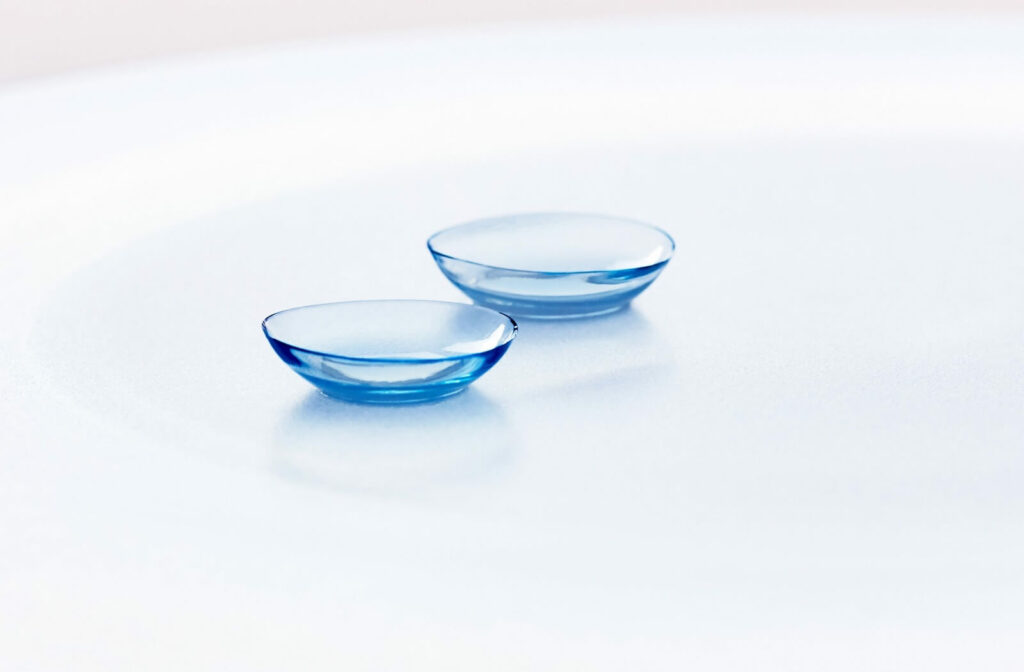Selecting the appropriate kind of contact lenses is essential for preserving eye health and comfort, particularly for those who have dry eyes. For people with dry eye condition, the question of whether to use monthly or daily contacts is still up for dispute.
Daily contact lenses are typically the best choice if you have dry eyes. Daily contact lens changes minimize dirt accumulation and keep the lenses from drying out. Additionally, it might be influenced by a number of variables, including financial constraints, lifestyle choices, environmental concerns, and human requirements.
Understanding Dry Eyes & Contact Lenses
When you have dry eye syndrome, your eyes become irritated and inflamed because eith er not enough tears are produced in them or they evaporate too quickly. Contact lens wear may make these symptoms worse. As a result, choosing the appropriate kind of contact lenses is essential.
Pros and Cons of Daily Disposable Contacts
The recommended use for daily disposable contacts is once per day. At the end of each day, you just throw them away. If you have dry eyes, there are several advantages to utilizing this alternative.
Pros:
- Hygiene: Using clean, new lenses each day helps reduce the possibility of deposits or irritants accumulating on the surface of the lenses, which can make symptoms worse for dry eyes.
- Convenience: There’s no need to clean or store lenses overnight, saving time and reducing the risk of contamination.
- Comfort: Compared to some materials used in monthly lenses, many daily disposables are constructed of materials that retain moisture better.
Cons:
- Cost: The convenience and benefits of daily disposables come at a higher price than monthly lenses, as you need a new pair every day.
- Environmental impact: Increased waste production is a significant drawback, with more packaging and lenses ending up in landfills.
- Prescription considerations: Not all prescriptions are available in daily disposable lenses. If you have a specialized prescription that is not supported, then daily disposables may simply not be an option.
Pros and Cons of Monthly Contact Lenses
The purpose of monthly contacts is to be utilized for the full month. They can be an affordable and environmentally beneficial choice if they are cleaned, stored, and cared for properly.
Pros:
- Cost-effectiveness: Monthly lenses are generally more cost-effective than daily lenses, as you use fewer lenses over time.
- Less waste: Using fewer lenses means less packaging waste and fewer lenses discarded in the landfills, which is better for the environment.
Cons:
- Maintenance: They require regular cleaning and proper storage, which can be a hassle and might increase the risk of eye infections if not done correctly.
- Potential comfort issues over time: Protein and lipid deposits can build up on monthly lenses, potentially causing discomfort for those with dry eyes.
Which is Better for Dry Eyes?
Because daily contact lenses are single-use, there may be fewer risks of infection or other factors aggravating your dry eyes. Daily contact lenses are very hygienic, you always know you’re getting a clean pair. Consider talking to your optometrist about the following factors:
- Individual eye condition: The intensity of your eye condition is a critical factor. Daily disposables may be the best comfort and hygienic option for moderate to severe dry eye sufferers because they start each day with a lens free of lipid or protein buildup that could exacerbate symptoms.
- Lifestyle considerations: Daily disposables are appealing if you have a busy schedule and would rather have convenience than upkeep. They do away with the requirement for a cleaning regimen, saving time and lowering the possibility of introducing irritants that could exacerbate symptoms of dry eyes.
- Budget constraints: Long-term, monthly lenses are more cost-effective. If money is a major consideration for you, monthly lenses may be suitable if taken care of and maintained properly. However, spending money on high-quality lens care products is necessary to reduce discomfort and preserve eye health.
- Environmental impact: The increased waste from everyday disposables might be a big drawback for anyone who cares about environmental sustainability.

Tips for Contact Lens Wearers With Dry Eyes
Regardless of the type of contact lens you choose, there are additional strategies to help manage dry eyes:
- Stay hydrated: Keeping your body well-hydrated helps maintain moisture in your eyes.
- Use eye drops: Lubricating eye drops approved for use with contact lenses can provide relief from dryness and discomfort.
- Take breaks: Regular breaks from screen time and proper blinking can help reduce dry eye symptoms, as well as occasional contact-free days.
- Consult regularly with your eye care professional: Regular check-ups can help adjust your contact lens prescription and dry eye treatment as needed.
Next Steps
Because they are more hygienic, daily contact lenses can be a better option for those with dry eyes overall. The best choice will ultimately depend on individual factors like financial constraints, lifestyle choices, degree of environmental concern, and severity of dry eye problems.It is important to consult with an optometrist who understands your specific needs in order to make an informed decision about comfort and eye health. At Virginia Eyecare Clinic, we can assist you in making that decision and provide relief from dry eye issues. Make an appointment to talk with a specialist in eye care to learn more.



